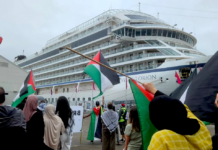AsiaPacificReport.nz
By Tevita Vuibau in Suva
It has been more than eight years since Nimilote Baleiloa saw the body of his late son Josefa Baleiloa in hospital.
Beaten and bruised, Josefa was laid up in a hospital bed, unconscious and unable to eat.
Josefa’s case was one of 11 featured in an Amnesty International (AI) report released this week titled Beating Justice: How Fiji’s Security Forces Get Away With Torture.
The report focuses on human rights violations perpetrated by Fijian defence forces on suspected criminals and escapees in their custody.
The report alleges Josefa was assaulted in Suva by a police and prison officers.
After the beating, his father claims Josefa was taken to the Nabua Police Station and left in the cell, calling for assistance and screaming in pain from the wounds he sustained.
He said when Josefa was finally taken to hospital, it was too late.
No arrests
He succumbed to his injuries several weeks later and no arrests were ever made in relation to his case.
When The Fiji Times visited Nimilote, he spoke of grief and guilt. Grief that he still carries at the loss of his son and guilt that he was unable to get justice.
He said eight years on, his soul was still not at rest.
Baleiloa said he could have fought harder, but did not have the money to pay lawyers to handle the case. He said it was not easy to live with the knowledge that he would not have justice done.
Baleiloa said he would not give up the fight.
Questions sent to the Fiji Police Force yesterday on the report remained unanswered
Under the 2013 Constitution, “absolute and unconditional immunity has been irrevocably granted to police officers from any criminal prosecution and from any civil or other liability in any court, tribunal or commission, in any proceedings including any legal, military, disciplinary or professional proceedings and from any order or judgment of any court, tribunal or commission, as a result of any direct or indirect participation, appointment or involvement in the government from December 5, 2006, to the date of the first sitting of the first Parliament elected after the commencement of the Constitution.”
‘Sharing a vision’
Fiji Times editor in chief Fred Wesley said today in an editorial that the release of the Beating Justice report “is going to attract a lot of interest”.
“The non-governmental organisation which is focused on human rights believes Fiji has failed to criminalise torture in line with its obligations in the 2013 Constitution and the Crimes Decree.”
Released at the Grand Pacific Hotel in Suva yesterday, the Amnesty International report highlights cases of interest, action taken, and made recommendations. It talks of investigations and prosecution.
“The report reiterated the global movement’s commitment to a world where human rights are enjoyed by all,” wrote Wesley.
“It talks about sharing a vision where every person can enjoy all the rights enshrined in the Universal Declaration of Human Rights and other international human rights standards.
“In its executive summary it suggests the ‘Fiji government has candidly acknowledged that ‘there have been a series of allegations pertaining to police brutality and the torture of detained persons. Such incidents have occurred for as long as the police force has been in existence’.”
The report said suspected criminals and escaped prisoners were most at risk of human rights violations in custody, and there was little sympathy for them when reports of torture emerged, Wesley wrote.
Security forces brutality
“Brutality by the security forces, [the report] suggested, resulted in at least five deaths since 2006 and other severe injuries, including one person having a leg amputated.
“It spoke about concerns raised by lawyers and witnesses, touched on the ‘close’ ties between the police and the military, and referred to ethno-political conflict and military coups.
“It claimed [that] despite accepting several Universal Periodic Review recommendations to stamp out abuses, violence (both actual and threatened) in Fiji, remains serious and widespread, and confessions, it claimed, were often obtained under duress.
“It suggested steps Fiji must take to effectively prevent torture and ill-treatment. The report, while damning, has not gone uncontested.
“The Attorney-General, Aiyaz Sayed-Khaiyum, labelled it as ‘biased and selective’.”
Sayed-Khaiyum expressed concern that Amnesty’s researchers did not contact the Fijian Director of Public Prosecutions, “who could have provided clarity on a number of issues that were raised in the report and also outlined the progress Fiji was making to dealing with complaints of alleged torture or abuse”.
Tevita Vuibau is a Fiji Times reporter.






